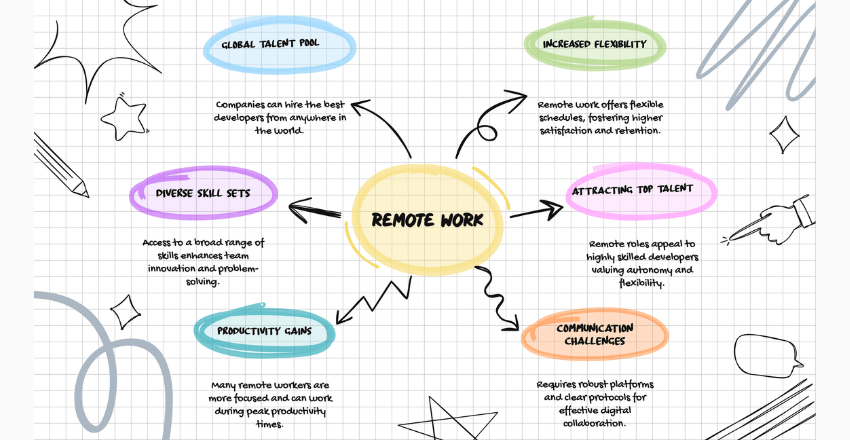Is there really a talent shortage in the software development industry? It seems every company is scrambling to find the best developers, but often they look in all the wrong places. Traditional hiring models focus on degrees and conventional qualifications.
This leaves a wealth of talent unnoticed. I’ve seen firsthand the incredible potential of overlooked talent pools. Overcoming this talent shortage requires us to change our perceptions and embrace new hiring practices.
The Problem with Traditional Hiring Practices
Many companies still rely on outdated hiring models. They emphasize degrees from prestigious universities and years of experience at big-name firms. But this approach overlooks a significant number of talented developers. Degrees and conventional qualifications don’t always equate to skill. Many brilliant minds never had the opportunity or interest to pursue formal education in computer science.
For example, consider the rise of self-taught developers. They often have a passion and drive that can surpass formally educated counterparts. Yet, these individuals often face significant barriers to entry. Hiring practices must evolve to recognize and value real skills over formal credentials.
Hidden Talent Pools
The tech industry has an untapped reservoir of talent. Bootcamps, online courses, and self-learning platforms have produced a new generation of developers. They may not have traditional qualifications, but they have the skills and dedication needed. By overlooking these groups, companies miss out on a goldmine of potential.
Take coding bootcamps, for example. They offer intensive training in a short period. Graduates from these programs often have hands-on experience and practical skills. They can start contributing to projects immediately, unlike some university graduates who may lack real-world experience.
Example: Jane, the Bootcamp Graduate

Jane didn’t follow the traditional path. She was a waitress who dabbled in coding in her spare time. After completing an online course, she enrolled in a bootcamp. Within six months, she had a portfolio of projects and a solid grasp of several programming languages.
Despite her skills, she struggled to get interviews because she didn’t have a degree. When a forward-thinking company took a chance on her, she excelled. Jane’s story isn’t unique. There are countless individuals like her, ready to make significant contributions if given the chance.
Expanding the Hiring Horizon
To address the talent shortage, companies need to expand their hiring horizons. This means looking beyond resumes and traditional qualifications. One effective method is skill-based assessments. These can help identify candidates with the necessary competencies, regardless of their background.
For instance, coding challenges and technical tests can be more indicative of a candidate’s abilities. Platforms like HackerRank and LeetCode provide environments where candidates can demonstrate their skills directly.
def is_prime(num):
if num <= 1:
return False
for i in range(2, int(num**0.5) + 1):
if num % i == 0:
return False
return True
print(is_prime(17)) # Output: TrueA simple coding test like this can reveal more about a candidate’s problem-solving skills than their resume.
Diversity and Inclusion
Diversity and inclusion are crucial in overcoming talent shortages. The tech industry has long struggled with underrepresentation of women, minorities, and other marginalized groups. By fostering an inclusive culture, companies can tap into these overlooked talent pools.
Consider initiatives that support underrepresented groups in tech. Programs like Girls Who Code and Black Girls Code are making strides in this area. Companies can partner with these organizations to find talented individuals who bring unique perspectives and skills to the table.
Changing Perceptions
Shifting the focus from traditional qualifications to actual skills requires a change in perception. Companies must recognize that talent can come from unconventional backgrounds. This shift can be challenging, but it’s necessary for long-term success.
Start by educating hiring managers about the value of diverse experiences. Highlight success stories of non-traditional hires who’ve excelled. Encourage a culture that values learning and growth over static qualifications.
Soft Skills Matter
Beyond technical abilities, soft skills are crucial. Communication, teamwork, and problem-solving are essential in software development. A candidate’s ability to collaborate and adapt often outweighs their technical prowess.
For example, a developer who can effectively communicate ideas and work well within a team can drive a project’s success. These skills are often honed through diverse life experiences, not just formal education.
Remote Work

The rise of remote work has expanded the talent pool in ways previously unimaginable. Companies are no longer limited by geography, opening up opportunities to hire talented developers from around the world. This shift has brought about profound changes in how we approach talent acquisition and management.
The Flexibility of Remote Teams
Remote work offers flexibility for both employers and employees. Companies can tap into a global talent pool, hiring the best developers regardless of their location. This flexibility means businesses can operate around the clock, leveraging different time zones to maintain productivity. For developers, remote work provides the freedom to choose their work environment, leading to higher job satisfaction and retention rates.
Diverse Skill Sets
A major advantage of remote work is access to a broader range of skills. Traditional hiring practices often limit companies to local talent or those willing to relocate. With remote work, businesses can hire developers with specialized skills that may be scarce locally. This diversity enhances innovation and problem-solving within teams.
For instance, a company in the United States can hire a machine learning expert from India, a front-end developer from Brazil, and a UX designer from Germany. Each brings unique perspectives and expertise, enriching the team’s capabilities.
Attracting Top Talent
Remote work can attract individuals who may not thrive in traditional office environments but excel in remote settings. Some developers are highly skilled but prefer the autonomy and flexibility that remote work offers. These individuals often bring a high level of productivity and creativity to their roles.
Moreover, remote work can be particularly appealing to those with caregiving responsibilities, disabilities, or other personal circumstances that make commuting difficult. By offering remote work options, companies can tap into this valuable talent pool, fostering a more inclusive and diverse workforce.
Boosting Productivity
Contrary to some misconceptions, remote work can boost productivity. Studies have shown that remote workers often put in longer hours and are more focused without the distractions of a traditional office. They can create personalized work environments that enhance their productivity.
For example, a developer might find they work best in the quiet of early morning or late at night. Remote work allows them to align their schedules with their peak productivity times, leading to higher quality work and greater job satisfaction.
Challenges of Remote Work
While the benefits are significant, remote work also presents challenges. Communication can be a hurdle, as remote teams rely heavily on digital tools for collaboration. It’s essential to have robust communication platforms and clear protocols to ensure everyone stays connected and informed.
Moreover, remote work requires a high level of self-discipline and time management. Not all developers may thrive in this environment without proper support. Companies should provide resources and training to help remote workers stay productive and engaged.
Building a Remote Culture
Creating a strong remote culture is crucial. This involves fostering a sense of community and belonging, even when team members are spread across the globe. Regular virtual meetings, team-building activities, and transparent communication can help build this culture.

For instance, companies like Automattic and GitLab have successfully implemented remote-first cultures. They emphasize asynchronous communication, where employees work at times that suit them best, and maintain a strong sense of team cohesion through regular updates and social interactions online.
Tools and Technologies

Leveraging the right tools and technologies is key to successful remote work. Communication platforms like Slack, Zoom, and Microsoft Teams facilitate real-time interaction. Project management tools like Jira, Trello, and Asana help keep projects on track. Version control systems like Git ensure seamless collaboration on code.
Additionally, cloud-based development environments enable developers to access their work from anywhere. This setup ensures that everyone has the tools they need to collaborate effectively, regardless of their location.
Example: A Global Team in Action
Consider a global software development team working on a new app. The project manager is in New York, the lead developer is in London, the UX designer is in Tokyo, and the QA engineer is in São Paulo. Despite the different time zones, they collaborate seamlessly through asynchronous communication.
Each member works during their peak productivity hours, handing off tasks as they complete their shifts. The lead developer commits code to a shared repository, the QA engineer runs tests and provides feedback, and the UX designer updates the interface based on the latest user research. The project manager coordinates these efforts, ensuring everyone stays aligned with the project goals.
This setup allows the team to maintain continuous progress, leveraging their diverse skills and perspectives to create a high-quality product.
Training and Development
Investing in training and development can mitigate the talent shortage. Providing continuous learning opportunities helps current employees grow and adapt. It also makes companies more attractive to potential hires.
Companies like Google and Amazon invest heavily in employee development. They offer programs that encourage skill growth and innovation. This not only helps retain talent but also ensures employees stay ahead of industry trends.
The Path Forward
Overcoming the talent shortage in software development isn’t about finding more graduates from top universities. It’s about changing how we view talent and where we look for it. By embracing new hiring practices, valuing skills over formal qualifications, and fostering diversity, we can tap into a vast reservoir of potential.
Think of a world where every passionate coder has the opportunity to shine, regardless of their background. It’s not just a dream. It’s the future of software development, and it starts with changing our perceptions today.














